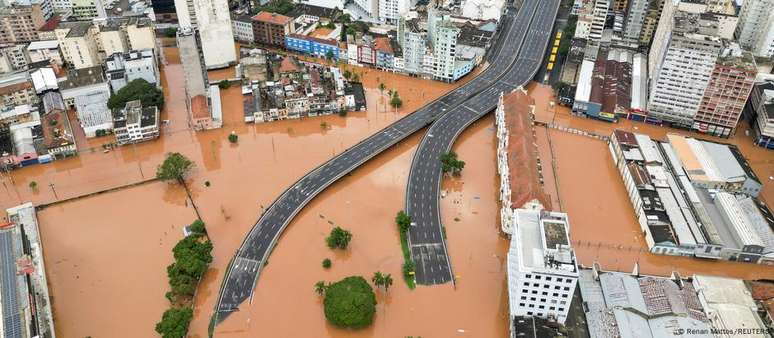The effects of the climate crisis are already being felt in Brazil and everyone can help reduce this impact. Everyday individual choices have a real impact on the planet. Climate change is one of the greatest challenges of the 21st century. Its effects, such as more intense heat waves, prolonged droughts, extreme rainfall, loss of biodiversity and rising sea levels, are already being felt in several parts of the world.
In Brazil it is no different: the floods in the South and the fires in the Cerrado and the Amazon are examples of a scenario that tends to get worse if our relationship with the environment is not transformed.
And contrary to what many think, tackling the climate crisis does not depend exclusively on public policies or big companies. While governments and businesses have a central responsibility in reducing greenhouse gas emissions, every person can also help reduce their carbon footprint. Everyday choices about what we buy, eat, how we move and how much we waste have a real impact on the planet.
“Having more sustainable days, seeking days with less carbon emissions, can actually be an attitude that often ends up seeming small in front of large conglomerates, but each individual attitude increases the awareness of the person himself, of those around him, such as family and friends, with a very important effect,” says Marcus Nakagawa, president director of the Brazilian Association of Professionals for Sustainable Development (Abraps) and author of the book 101 days with more sustainable actions to change the world.
Below are practical actions that can be implemented into everyday life to help stop global warming and build a more sustainable culture.
1. Rethink the way you move
Transportation is one of the largest sources of CO₂ (carbon dioxide) emissions, including the use of cars and also aviation.
Research by the National Transport Confederation (CNT) shows that, while a city bus with a capacity of 70 passengers emits approximately 0.24 kilograms of CO₂ per tonne per useful kilometer (CO₂/TKU), a petrol car, with an average seating capacity of two people, emits 1.49 kg of CO₂/TKU, corresponding to an emission approximately 520.8% higher than that of a bus.
The comparison carried out by the study also shows that if a bus with 70 passengers travels 100 kilometres, its emission is 126 kilograms of CO₂. To transport the same number of people by car, following the average of two per vehicle, 35 cars would be needed, with emissions that would reach 782.25 kilograms of CO₂, or 6.21 times greater.
The aviation sector is responsible for around 3% of global carbon emissions, mostly from burning kerosene on flights.
Therefore, experts advise, whenever possible, to prefer walking, cycling or using public transport instead of a private car. If traveling by car is unavoidable, carpooling is an option that reduces the number of vehicles on the roads, helping to protect the environment.
“One of the biggest villains is air travel, which can often be minimized through online meetings or through bus travel, when you are in your own territory. As for cars, as much as possible, try to fuel the vehicle with ethanol, avoiding fossil fuels. And look, when possible, for public transport,” adds Nakagawa.
2. Reduce consumption
Excessive consumption is another major cause of environmental degradation. The production, transportation and disposal of products require the use of natural resources, energy and water, with the clothing industry responsible for 10% of global carbon emissions. So, before buying new clothes, it is worth asking yourself: do I really need them?
Choosing items that are durable, reusable and produced in a more environmentally friendly way also helps reduce the demand for raw materials and emissions associated with production. A good practice is to prioritize brands that adopt environmental and transparent commitments.
Purchasing from small local producers, in addition to strengthening the regional economy, reduces emissions associated with long-distance transportation.
“The first step is to avoid being a mere consumer of trends. Consume consciously and, when possible, value initiatives that help optimize the use of natural resources as a whole,” says Talita Martins, consultant at the Brazilian ESG Institute (IBESG) and professor of the MBA in Sustainability, ESG and Innovation at Trevisan Escola de Negócios.
3. Watch out for food waste
Data from the Brazilian Institute of Geography and Statistics (IBGE) indicates that approximately 46 million tons of food are wasted in the country every year, which represents 30% of all Brazilian production.
This means that much more than food, all the resources used in cultivation, transportation and storage are also thrown away. Additionally, organic waste generates methane, a greenhouse gas.
Planning purchases, making the most of food and storing fruit and vegetables correctly so that they last longer are simple steps that make the difference. Composting organic waste at home is also an efficient alternative as the action turns waste into natural fertilizer and reduces the volume of waste sent to landfill.
But that’s not all, choosing natural foods instead of ultra-processed foods also helps protect the planet. “Ultra-processed foods have long, energy-intensive production, packaging and transportation chains. Reducing their consumption implies reducing the demand for high-impact industrial systems and, at the same time, encouraging more local and natural food practices,” explains Nathalia Weber, director of CCS Brasil, a non-economic organization that promotes cooperation between government, industry and society for the development of carbon capture and storage activities in Brazil.
4. Decrease your meat consumption
Brazil ended 2024 with 238.2 million cattle, 12% higher than the country’s estimated population of 212.5 million in the same year. The survey comes from the IBGE Municipal Livestock Survey (PPM).
These animals, during their lives, release gases such as methane and nitrous oxide which cause the greenhouse effect. Therefore, reducing meat consumption, even one day a week or replacing this food in some meals, can already have a positive impact on the environment.
“Beef production is among the activities that generate the greatest greenhouse gas emissions, mainly due to the methane released by cattle and changes in land use linked to extensive farming. Reducing consumption does not mean eliminating, but enhancing moderation. Choosing better food sources and reducing excesses already brings significant environmental benefits”, adds Weber.
5. Save electricity and water
The electricity used in Brazil comes mainly from renewable sources, such as hydroelectric plants. Excessive consumption of electricity has an environmental impact, especially in periods of drought, when it is necessary to use thermoelectric plants powered by fossil fuels.
Changing incandescent light bulbs for LED ones, unplugging appliances when not in use, and adjusting the thermostat on your refrigerator and air conditioning are simple measures that make a difference. Furthermore, installing solar panels, when possible, is another way to reduce dependence on the traditional electricity grid and contribute to the energy transition.
As we know, water is a limited resource and its inappropriate use worsens both water crises and greenhouse gas emissions, since treating and pumping it requires energy.
Turning off the tap while brushing your teeth, fixing leaks, reducing time in the shower and collecting rainwater for domestic uses, such as washing the garden, are simple actions that help preserve this asset.
6. Reduce the use of single-use plastic
Plastic is a great enemy of the environment. They require oil to produce and can take centuries to decompose. Reusable bags, durable bottles and glasses, and glass or metal containers replace single-use plastic.
Correctly separating waste and sending it for recycling are also simple attitudes that help.
“The simple change in habits is to try, most of the time, to recycle, throw waste in the right places and also try to ensure that your building or apartment building carries out the correct waste disposal activities,” adds Nakagawa.
7. Try to understand more about the topic
According to experts interviewed by the DW report, for people to take these individual initiatives that make a difference to the planet, they must understand the effects of climate change on the daily lives of the entire population. It is from this awareness that behaviors become more responsible.
“More than awareness, it is necessary to have the attitude of involving other people, of educating, of knowing and deepening the topic, of voting correctly for politicians, legislators, managers who take care of our planet, who understand it as a priority, who understand it as a climate emergency”, adds Nakagawa.
Source: Terra
Rose James is a Gossipify movie and series reviewer known for her in-depth analysis and unique perspective on the latest releases. With a background in film studies, she provides engaging and informative reviews, and keeps readers up to date with industry trends and emerging talents.







